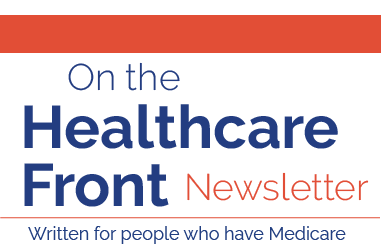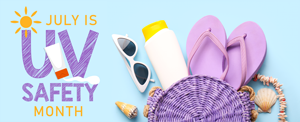
|
Issue #39 July 2025 Newsletter issues will tell you about Acentra Health’s free services for people who have Medicare as well as information from Medicare and other health-related tips. Do you receive email reminders when new issues of On the Healthcare Front are published? |
when should you call acentra health?
- If you are not ready to be discharged from the hospital.
- If your Medicare skilled services are ending too soon. Examples of skilled services include things like physical therapy and nursing services.
- If you have a concern about the quality of care you received.
- If you have a concern about your medical care that needs to be taken care of right away.
Click on the button below for the phone number for your state. These services are free for people who have Medicare.

july is uv awareness month: protect your skin, eyes, and health
Ultraviolet (UV) rays from the sun can damage your skin and eyes, even on cloudy days or during short trips outside. Too much exposure to UV rays increases your risk of sunburn, skin aging, vision problems, and skin cancer.
While Medicare does not cover sunscreen, it does cover an Annual Wellness Visit. This is a good time to talk to your doctor about any skin changes you have noticed and steps you can take to protect your health.
Visit our UV Awareness page for more information about sun safety.

storing your medicines properly, especially with the summer heat
Did you know that warmer weather can affect your medications?
According to the Centers for Disease Control and Prevention (CDC), certain medicines, like insulin, inhalers, and EpiPens, can become less effective if they get too hot.
The U.S. Food and Drug Administration (FDA) also reminds us that heat and humidity can damage medical devices like blood glucose meters and test strips, which can lead to inaccurate readings. Therefore, it is important to store your medications and devices properly, especially during the summer months.
Here are a few easy ways to help keep your medications working the way they should:
- Store at the right temperature. Most medications should be kept at room temperature—between 68 degrees Fahrenheit (°F) and 77°F—unless the label says otherwise.
- Avoid heat and moisture. Try not to store your medications in the bathroom or near kitchen appliances, since these spots can get hot and humid.
- Don’t leave them in the car. Even on a mild day, the inside of a parked car can get dangerously hot in just a few minutes.
Taking good care of your medications helps make sure they’ll take good care of you. If you're ever unsure about how to store a specific medicine or device, ask your doctor or pharmacist. They're there to help you.
|
More Information
|
in this issue |
don't keep this a secret
Share this newsletter with friends who have Medicare by sharing this link: www.acentraqio.com/ohf/July2025
is high blood pressure an emergency?

Written by Ari Lapin, MD
Associate Medical Director
Acentra Health BFCC-QIO
As an emergency doctor, I often see patients who are sent to the emergency department (ED) for high blood pressure. Many times, they do not have symptoms. However, they are understandably still worried.
Sometimes, they’re sent by another doctor or healthcare professional. Other times, they had a high reading at home or in a pharmacy.
The common question is “Is this an emergency?” Thankfully, in most cases, the answer is no.
Hypertension is the medical term used for high blood pressure. It is a well-known risk factor for long-term health issues. These can include heart attacks, strokes, and kidney disease. It is important to know the difference between long-term risks and the immediate need for emergency care.
→ When a person has high blood pressure without any other symptoms or signs of organ damage, it is called “asymptomatic elevated blood pressure.” Even though the number on the monitor is high, it is not an emergency.
In the past, patients with very high readings, even without symptoms, were treated in the ED. Intravenous (IV) medicines were used to quickly lower their blood pressure. However, newer research has made it clear that this can be harmful.
Your body gets used to high pressures over time. If that pressure is lowered too quickly, blood flow may be reduced to critical organs like your brain, heart, and kidneys. This can then cause the very problems that were trying to be prevented, including strokes and heart attacks.
Many experts, including the American College of Emergency Physicians and the American Heart Association, agree that high blood pressure without symptoms does not need emergency care. There is no specific blood pressure number that means a trip to the ED is needed. Also, routine testing is not suggested.
Instead, outpatient care with your regular doctor is the best step to take. This way, gradual medicine changes can be done as needed, and your doctor can watch your blood pressure over time.
As with any medical concern, there are exceptions. In addition to high blood pressure, you may have:
- Chest pain
- Shortness of breath
- Confusion
- Sudden vision changes
- Weakness or numbness on one side of the body
- Difficulty speaking
These symptoms may be a sign of a high blood pressure emergency or another serious condition. If these happen, go to the ED right away.
For those who measure their blood pressure at home, once a day is enough. This should be done around the same time each day and when you are at rest. Keep a written log to share with your doctor. Checking it too often can cause stress and anxiety, which can raise the blood pressure reading.
Knowing whether high blood pressure is a chronic condition or an emergency can help you avoid unneeded ED visits. High blood pressure is best managed in an outpatient setting unless you have other concerning symptoms.
|
More Information
|
taking care of your skin this summer

It’s summertime! Say goodbye to winter gear and bring out the shorts and t-shirts. Enjoying some fun in the sun can bring a smile to your face, but while soaking up some vitamin D, keeping skin safety in mind is a priority.
As we get older, our skin becomes thinner and more sensitive. Years of sun exposure can lead to dryness and discoloration. It can also increase your risk of skin cancer. While that can be scary, the good news is that you can take simple steps to protect your skin that will make a big difference.
- Wear sunscreen
- Stay hydrated
- Use a wide-brimmed hat and light clothing
Keep watch: With more skin showing, you might notice a spot, mole, or dry patch you hadn’t seen before!
- If you see a new spot, a mole that’s changing, or a sore that doesn’t heal, it’s a good idea to call your doctor. These could be signs of something more serious, and it’s always better to be safe than sorry.
If you have Medicare, your Yearly Wellness Visit is a great time to mention any skin concerns. If your doctor thinks a spot needs a closer look, they can refer you to a specialist. Medicare may cover that visit if it’s considered medically necessary.
A small step today could make a big difference for your health tomorrow.
|
More Information
|
Publication No. R146810-155-6/2025. This material was prepared by Acentra Health, a Medicare Quality Improvement Organization under contract with the Centers for Medicare & Medicaid Services (CMS), an agency of the U.S. Department of Health and Human Services. The contents presented do not necessarily reflect CMS policy.




